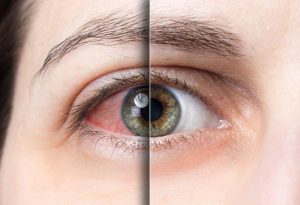Many people confuse the two distinct gastrointestinal diseases: Irritable bowel syndrome (IBS) and inflammatory bowel disease (IBD).
Both affect the gastrointestinal tract, causing symptoms such as abdominal pain and persistent discomfort, as well as changes in bowel habits.
While both diseases might sometimes look similar, they differ in their underlying causes, method of diagnosis and treatment strategies.
In this blog, you’re about to learn the key differences between IBS and IBD and never fall into the trap of confusing the two conditions again. We have outlined the main differences in their symptoms, causes and treatment strategies.
Having said that, let’s first break down the meaning of IBS and IBD separately.
Understanding IBS & IBD In Easy Words
Irritable bowel syndrome is a chronic disorder which is characterized by a range of symptoms such as recurrent abdominal pain, bloating, gas and episodes of diarrhea or constipation.
On the other hand, a person with inflammatory bowel disease experiences similar symptoms but with chronic inflammation and damage to certain parts of the GI tract. IBD is a chronic inflammation that is divided into two major categories: Ulcerative Colitis and Crohn’s disease.
IBS and IBD can be a real pain in the gut as both diseases can disrupt your daily lifestyle. The symptoms might vary from person to person; however, they can negatively affect their work and social life.
Six Key Differences Between IBS and IBD
Here are the six major differences between the two diseases that will give you a clear picture of IBD & IBS.
| IBS (Irritable bowel syndrome) | IBD (Inflammatory bowel disease) | |
| Prevalence | Affects between 25 and 45 million men and women in the US alone. | Almost 2.4 million Americans suffer from IBD every year. |
| Symptoms | Abdominal discomfort (might occur after eating) Abdominal bloating Flatulence (gas) Feeling of fullness in stomachDiarrhea or constipationSense of incomplete evacuation of bowel | Along with IBS symptoms, people might experience: Abdominal pain Blood in stoolExtreme fatigueJoint painWeight loss |
| Inflammation involved | Inflammation is not involved | Inflammation occurs in the affected areas |
| Underlying Cause | Several factors can be involved like food intolerance, visceral hypersensitivity or other physiological and genetic factors | Occurs due to an immune response. |
| Diagnosis | Based on symptoms, clinical condition, family history, physical exam and ruling out other conditions. | Done using colonoscopy, endoscopy and lab tests |
| Treatment | Symptomatic treatment is done through lifestyle modifications, behavioural therapy, dietary changes and medications for abdominal pain or diarrhea. | Medicines to reduce inflammation, like corticosteroids, immunomodulators, and biologics are given. |
Some Common Causes Of IBD & IBS
The exact causes of both gastrointestinal diseases are not fully understood and are still under research. However, it is widely believed that genetics and family history play a major role in both.
In IBS, abdominal pain is caused by abnormal bowel contractions and oversensitivity of the gastrointestinal nerves. This means that the nerve endings in the GI linings are unusually sensitive and get triggered for multiple reasons.
Some potential risk factors that contribute to hyperactivity in patients with IBS are:
- Underlying bacterial infections (gastroenteritis)
- Food intolerances or hypersensitivity
- Mood disorders (anxiety or depression)
As a result, the patient experiences recurrent pain and discomfort in the abdomen, especially after eating. After passing stool, the pain seems to get better in some people.
In patients suffering from IBD, the exact cause is unknown. However, the long-lasting inflammation is generally due to the immune response to bacteria, viruses or food particles.
Some possible risk factors that contribute to Crohn’s disease or Ulcerative Colitis are age, family history, genetics, and certain medications.
How Are The Symptoms of IBS & IBD Different?
The signs and symptoms of IBS & IBD might overlap in many people. Therefore, self-diagnosis cannot be done at home. If you experience any concerning symptoms like abdominal pain or cramps, it is necessary to visit a doctor nearby.
If you have IBS, you might suffer from bloating, flatulence, constipation or diarrhoea and a feeling of incomplete evacuation of bowel.
People with IBD have the same symptoms as IBS but with additional symptoms such as,
- Blood in stool
- Weight loss
- Joint pains
- Fatigue and body aches
- Malnutrition and delayed growth in children.
What Are The Possible Treatment Options For IBS & IBD?
The treatment strategy for IBS and IBD vary depending upon the severity of your symptoms and the disease progression.
In IBS patients, symptomatic treatment is done that includes
- Making lifestyle modifications
- Avoiding spicy, fried or fatty foods
- Reducing stress
- Medications such as antispasmodics, antidiarrheals or laxatives
- The treatment of IBD is a bit complex as it depends on whether the patient has Ulcerative Colitis or Crohn’s disease. Some common treatment options are:
- Anti-inflammatory drugs such as mesalazine or balsalazide
- Immunosuppressants such as mercaptopurine or azathioprine
- Pain-controlling medicines
- Antibiotics such as ciprofloxacin or metronidazole
Visit Family Urgent Care For Managing IBS or IBD
If you’re experiencing any recurrent abdominal pain, flatulence, diarrhea or constipation, it’s time for a quick check-up. Early detection of gastrointestinal problems can prevent further complications and help recover from gastric issues at a faster rate.
Whether you suspect IBS or IBD, our team of experienced healthcare providers and doctors are ready to listen to your concerns and help you walk on the path of recovery.
Not to mention, you don’t need to visit lab testing facilities because we have an in-house lab testing and imaging facility.
Once you visit our urgent care clinic, the doctor will evaluate your symptoms, ask your medical and family history and order some tests, if necessary. When the diagnosis is confirmed, the doctor counsels you about the medications, lifestyle modifications and dietary changes.
So, do not hesitate and walk into our clinic or book your appointment right away to get relief from your symptoms.


























